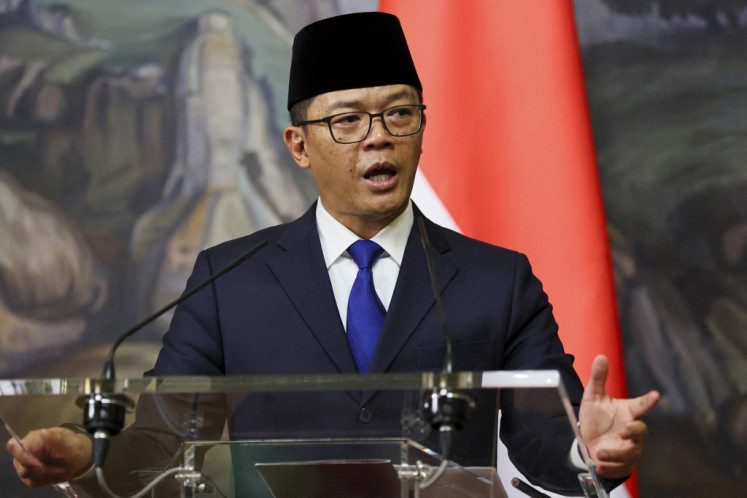Popular Reads
Top Results
Can't find what you're looking for?
View all search resultsPopular Reads
Top Results
Can't find what you're looking for?
View all search resultsA report card for Jakarta's healthcare program
Residents of Koja, North Jakarta, receive their KJS cards distributed directly by Governor Joko Widodo in May
Change text size
Gift Premium Articles
to Anyone
 Residents of Koja, North Jakarta, receive their KJS cards distributed directly by Governor Joko Widodo in May. (JP/P.J. Leo) (JP/P.J. Leo)
Residents of Koja, North Jakarta, receive their KJS cards distributed directly by Governor Joko Widodo in May. (JP/P.J. Leo) (JP/P.J. Leo)
Residents of Koja, North Jakarta, receive their KJS cards distributed directly by Governor Joko Widodo in May. (JP/P.J. Leo)
The Jakarta Health Card (KJS) program of universal health care for residents of the Indonesian capital comes under close scrutiny now that it passed its one'year mark in November. A team of reporters from The Jakarta Post ' Adhi Bhaskara, A. Kurniawan Ulung, Dewanti Aditya Wardhani, Dylan Amirio, Fedina Sundaryani, Goldy Evi Grace Simatupang, Grace Dwitiya Amianti, Gregorius Adhi, Indra Budiari, Putera Hasudungan and Tama Salim ' scoured Jakarta's hospitals and health centers, and City Hall to find out what people say about the KJS.
The patient registration waiting room at Tarakan General Hospital in Central Jakarta, which is run by the Jakarta provincial government, was filled one recent morning.
It was only 8 a.m., but all the seats were taken. Some sat on the floor. Others had been there since 1 a.m. to get a lower number to be seen.
Everyone carries piles of documents to ensure they qualify for free treatment under the KJS system. Rejection means repeating the process.
Noise turned to silence every time the security guard announced the next number to be seen.
This is just to get the paperwork out of the way.
When the hospital is satisfied that the person qualifies under the KJS program, the patient moves to the next phase: registering with the appropriate doctor.
And then another long wait.
After the doctor, they have to go to the hospital pharmacy, where the lines are long, to get whatever medicine has been prescribed ' assuming it's in stock.
Een Sumiati, a printing company employee seeking treatment for an enlarged thyroid, is confused by the complex and lengthy administrative procedures.
The thin 38-year-old fears asking further questions because the hospital workers had barked at her on earlier visits. 'Sure it's free, but the wait is long. And the staff are so unfriendly.'
Merry Nainggolan, a widow, is thankful for the free services even though she too felt that hospital workers in general could be a little friendlier. She had a bad experience earlier at a private hospital before coming to Tarakan General Hospital.
This 45-year-old single mother moved to Tarakan General Hospital after the private hospital refused to provide her with treatment for a kidney stone under KJS. If not for assistance from her church, she would have gone untreated there.
Although, under the KJS system, she also is entitled to free medicine for her current ailment of a gastrointestinal cyst, the medicine she has been prescribed is not consistently available at the hospital pharmacy.
She says that the hospital gave her only two pills, even though the doctor gave her a prescription for a month's supply. 'The pharmacy told me the medicine was out of stock and I had to buy the rest elsewhere.'
Merry praises Jakarta Governor Joko 'Jokowi' Widodo, who introduced his universal healthcare system in the capital city as soon as he was elected governor in October 2012. 'Jokowi is an angel sent from heaven,' she says. 'He's like Mother Teresa.'
A little more than a year since its launch, KJS has had mixed reviews.
While patient numbers are up, there are questions about the program's efficiency. A full evaluation of KJS's first year will be published later this month.
It took Jokowi less than a month after he came into office to launch the system, which entitles card holders to free health care at public and private hospitals in the city.
A year later, according to the Jakarta Health Agency's Regional Health Security Unit, 3.2 million people have registered for the program. Jokowi hopes to enroll 4.7 million, or about half of the residents of Jakarta, in the program.
Of these however, only 1.2 million are expected to use free health care, which still means overcrowded waiting rooms and third class inpatient facilities. Others would prefer to pay for presumably shorter waiting times and higher quality service.
The city's poor have been grateful for improved access to health care. However, use of the card system has exposed weaknesses: Jakarta doesn't have enough hospitals, doctors and medical workers to provide universal health care.
To its credit, the Jakarta government has reduced the procedures for obtaining KJS coverage. Patients don't have to wait weeks for their cards to get the service; just a registration number will do.
Still, the process requires a lot of paperwork, including an ID card, a Family Card (KK) and a referral from a doctor at a local community health center (puskesmas).
Hasbullah, 48, who says he had not yet received his KJS card, has registered and can get free treatment for his daughter, who has encephalitis, a brain inflammation. She under the care of an acclaimed child neurologist at Cipto Mangunkusumo General Hospital, the city's main general hospital, in Central Jakarta.
The only drawback is going back and forth to different buildings within the huge hospital complex, he says.
Previously, Hasbullah took his daughter to a private hospital where he ran up a Rp 60-million (US$4,912) bill before deciding he couldn't afford it and turned to KJS.
His earnings from teaching pupils to read the Koran were not enough. He is Rp 16 million in debt to the hospital.
'KJS is helpful. My daughter isn't cured yet, but at least she's getting treatment,' he says.
Cipto Mangunkusumo General Hospital, regarded as Indonesia's main referral hospital, has set up a special ward for inpatient services under the KJS for poor patients who are seriously ill.
The patients are referred by community health centers to public hospitals, for assessment or referral to specialized facilities, including private hospitals.
In general, private hospitals only accept KJS patients referred by public hospitals, refusing direct referrals from community health centers. If they do not have specialists or facilities required to treat a seriously ill patient, a private hospital might send them to a more qualified hospital, like Cipto Mangunkusumo General Hospital.
These private hospitals also assess the patients to determine if they have the required facilities and expertise for treatment ' and whether they have enough third class beds to accommodate them.
Some private hospitals enlisting in Jokowi's KJS system have complained about the set reimbursement fees paid by the government which they claim barely cover expenditures.
In April, 16 private hospitals threatened to pull out of the program, backing off after learning that Jokowi's opposition in the Jakarta Legislative Council wanted to use the threat to impeach the governor. Jokowi responded by agreeing to review the rates.
While public hospitals usually have separate waiting and processing areas for KJS patients, private hospitals, including the Jakarta Medical Center in South Jakarta, Jakarta Hospital in South Jakarta and PGI Cikini Hospital in Central Jakarta, have KJS patients wait in public waiting rooms with paying patients at a special counter.
The waiting room conditions at these private hospitals are less crowded than at public hospitals. Upscale Jakarta Hospital even provides good air-conditioning.
The number of patients visiting public and private hospitals has surged, with some reporting double or triple the figures before KJS was launched.
Numbers eased after the Jakarta government required that patients must first visit local community health centers and get referrals.
In fact, many are treated at the community health centers.
'It's not complicated. I just have to bring my ID Card and Family Card,' said Hasan Basri, a patient with cataracts, who was waiting at a health center in Kebon Jeruk, West Jakarta. 'I get free medicine, too.'
Dara Pahlarini, a dentist who heads the Palmerah district community health center in West Jakarta, says since the KJS has eased access to medical care, many people are insisting on unnecessary doctors' referrals to hospitals, or free medicine.
Erika, who heads a subdistrict community health center in Palmerah, admits she gets irritated by such patients. 'You just have to be professional about it, and treat them as best as you can.'
Budhi Asih General Hospital, a hospital under the Jakarta administration, saw its number of patients double to 1,000 per day since KJS was launched, settling to around 800 after the referral requirement was imposed in April.
This number however remains high, Budhi Asih General Hospital spokesman Hamonangan Sirait says. 'It's stretching our facilities, resources and staffers,' the doctor adds.
Lines are long. For frustrated patients, there are middlemen who offer line-waiting services for up to Rp 150,000. One clue of their presence is the 'beware of middlemen' signs posted by the hospitals.
The Regional Health Security Unit promises to deal with the perennial problem of line jumpers with computers.
All community health centers in Jakarta will soon be linked to participating hospitals, to refer their patients online and schedule appointments directly.
'If this system works, we'll keep it,' says Regional Health Security Unit head Theryoto.









